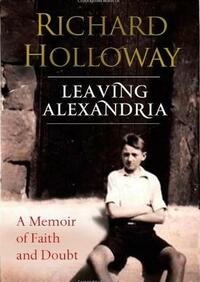Take a photo of a barcode or cover
This is a wonderful, funny coming of age in the Anglican communion story. The Author becomes a Bishop of the Scottish arm of the Anglican church and he has an honest view of history in the making. Not for the faithful faint of heart.
This is a haunting and evocative appraisal of one man's spiritual journey, but it a also a reflection on modern Christianity. Although I come from a very different Christian tradition to Holloway's, I found much to identify with here, and reading the book was at times a painful experience because of that.
It is also unexpectedly (unintentionally perhaps) an apology for poetry; scarcely a page goes by without Holloway quoting one poet or other, finding that poems can express ideas where prose is woefully inadequate. As a lover of poetry, I appreciated this touch, and indeed found new poets to explore among more familiar names. As Holloway says, "neither [fiction or poetry] sought to explain, only to express, to give voice to the earth's anger and sorrow."
Unsurprisingly then, Holloway identifies most strongly with the narrative power of the gospel, rejecting the more dogmatic approach of much Christian teaching today. Maybe the two can go together, or maybe as Holloway himself found, the two approaches live in perpetual opposition.
It is also unexpectedly (unintentionally perhaps) an apology for poetry; scarcely a page goes by without Holloway quoting one poet or other, finding that poems can express ideas where prose is woefully inadequate. As a lover of poetry, I appreciated this touch, and indeed found new poets to explore among more familiar names. As Holloway says, "neither [fiction or poetry] sought to explain, only to express, to give voice to the earth's anger and sorrow."
Unsurprisingly then, Holloway identifies most strongly with the narrative power of the gospel, rejecting the more dogmatic approach of much Christian teaching today. Maybe the two can go together, or maybe as Holloway himself found, the two approaches live in perpetual opposition.
challenging
emotional
funny
hopeful
informative
inspiring
reflective
medium-paced
I’m so so interested by Richard Holloway - and this peek into his life is lovely and relatable. He is such a sweet man who dedicated his life to lifting others, yet he still saw himself as failing to live up to a holy standard. There is so much to learn from and empathize with in his life.
hopeful
reflective
slow-paced
It was fascinating to read about how a wee boy from the tenements of Glasgow ended up becoming one of the top clergymen in Scotland and equally fascinating to hear about how he wrestled with his doubts, eventually becoming agnostic or 'post religionist' as he has sometimes referred to himself.
The book is a very readable account of Richard Holloway's early life, his time in college, working in Africa, in America, back in the poorer parts of Glasgow, and his support for sometimes controversial subjects, controversial for a clergyman anyway, such as LGBT rights. I was particularly interested to find out about the remarkable woman that was Lilias Graham, obviously a much loved and respected woman and a powerful advocate for improving the lives of the impoverished in the Gorbals despite her own well to do background.
What is clear is that this has been a life of questions and self doubt. I think it will be quite reassuring for many people to realise that anyone, no matter how confident they appear, no matter how high a position they have achieved in their working lives, can be plagued with self-doubt and confusion.
Leaving Alexandria is a very honest thought-provoking memoir, sharing thoughts and feelings which many people of faith, or indeed of no faith, will be able to identify with. A worthy addition to the Scottish Canons collection.
The book is a very readable account of Richard Holloway's early life, his time in college, working in Africa, in America, back in the poorer parts of Glasgow, and his support for sometimes controversial subjects, controversial for a clergyman anyway, such as LGBT rights. I was particularly interested to find out about the remarkable woman that was Lilias Graham, obviously a much loved and respected woman and a powerful advocate for improving the lives of the impoverished in the Gorbals despite her own well to do background.
What is clear is that this has been a life of questions and self doubt. I think it will be quite reassuring for many people to realise that anyone, no matter how confident they appear, no matter how high a position they have achieved in their working lives, can be plagued with self-doubt and confusion.
Leaving Alexandria is a very honest thought-provoking memoir, sharing thoughts and feelings which many people of faith, or indeed of no faith, will be able to identify with. A worthy addition to the Scottish Canons collection.
reflective
medium-paced
An erudite and helpful memoir for those seeking to discern eternal truths away from dogmatic thinking. It doesn't give answers but explores different thought processes and uses poetry to enhance the narrative. At times there is too much overthinking and self criticism which has obviously proved a burden to the Author throughout his life. I felt a strong sympathy for his long suffering wife and admire their joint, forward thinking pastoral work over many years.
informative
inspiring
reflective
medium-paced
I was pleasantly surprised by this book. It is well written, tells the author's story, informs about Anglicanism, reflects of religion and non-belief and so much more. As Anglican Catholicism is not my religious background, I learned much. As someone who once believed and does not any more, I felt a kinship with the author's journey and may have even gained a new appreciation of some of the positive endeavors of religion. It is notable that Richard Holloway is a former Bishop who gave almost 75 years of his life to the church. This book may be helpful to anyone who has a religious background and leans now more towards unbelief. This is my new most recommended book.
challenging
hopeful
informative
inspiring
reflective
medium-paced
Richard Holloway is a significant person to read and his journey away from Christianity is an important and interesting one. But I found this autobiography fairly average except where he specifically analyses and critiques contemporary Christianity and the issues it faces - including his engagement with those issues. I was pretty bored with what seemed to me an endless commentary on place names, streets, buildings, towns, etc. Clearly Holloway connects with the places and people of his life but I didn't find his writing at all engaging. Worth reading, I think, because of who Holloway is and his influence on Anglicanism and his recent writings on morality without God (which I am yet to read). So check it out, but for me, I was hoping for a much more subversive and engaging piece of writing.



